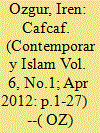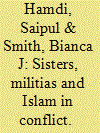| Srl | Item |
| 1 |
ID:
110958


|
|
|
|
|
| Publication |
2012.
|
| Summary/Abstract |
Cafcaf is a humor magazine published by a group of religiously conservative Turks, who esteem and uphold what they consider to be Islamic norms and principles in their cartoons. By offering a close reading of Cafcaf, this article sheds light on transformations among Turkey's Islamic communities. Scholars from a wide range of disciplines have been examining how the Islamic movement in Turkey has shifted course since the late 1990s. To this end, they have been studying the extent to which Islamists in the country have undergone changes with regards to their political aspirations and social attitudes. However, only a handful of these works have analyzed how genres of popular culture have responded to and echoed these transformations. A discussion of Cafcaf fills this gap by demonstrating how a group of Muslim youth reacts and responds to the changing outlooks and lifestyles of Turkey's Islamists. The cartoons shed light on the efforts among young Muslims to establish a middle ground where they can negotiate their religious identities with their secular surroundings. The cartoons indicate that Muslim youth's enthusiasm and willingness to attain this goal is sometimes coupled by a cascade of trepidations and hesitations.
|
|
|
|
|
|
|
|
|
|
|
|
|
|
|
|
| 2 |
ID:
110961


|
|
|
|
|
| Publication |
2012.
|
| Summary/Abstract |
In the post 9/11 context new forms of governance of Muslims based on the resurfacing of old colonial ideas have emerged. Micro-surveillance measures involving the hyper-legalization of settled Muslim populations in Western Europe have led to a curtailment of rights through legal measures and political discourses. A new form of governmentality identifies signs of religious belief, such as the hijab, as a potential threat to national identity and security. Operating through a combination of legal mechanisms and popular narratives based on themes associated with colonial governance, Muslims have been 'cast out' of law and politics. With decolonization, this narrative has been transformed into one about a 'home-grown' alien force whose transnational attachments, thought to be evident in a refusal to confine religious identity to the private sphere, are presented as a risk that needs to be contained. European Muslims have rebelled against their removal from the protection of the law by declaring their rights as citizens and as humans as a way of combating religious and cultural discrimination. Historically, human rights have emerged out of processes of containment and exclusions. Today, a new generation of Muslims has appropriated the language of rights to protest against these exclusions, holding the mirror up to the transgressors of human rights: their original proponents. This is a case of 'realized citizenship' in which European Muslims gain access to and mobilize resources and skills to bridge the gap between the promise of citizenship and human rights.
|
|
|
|
|
|
|
|
|
|
|
|
|
|
|
|
| 3 |
ID:
110960


|
|
|
|
|
| Publication |
2012.
|
| Summary/Abstract |
This paper uses an interdisciplinary approach to show why Western social scientific explanations of political crowds in North Africa and the Arab Middle East have failed to provide an understanding of the causes and effects of popular revolt. I trace these misunderstandings to an inherited body of European writings on crowd theory and on Islamic and Muslim political power. Some scholars who have also criticized mainstream analysis of the so-called "Arab Street" are shown as relevant to a new understanding of political crowds.
|
|
|
|
|
|
|
|
|
|
|
|
|
|
|
|
| 4 |
ID:
110959


|
|
|